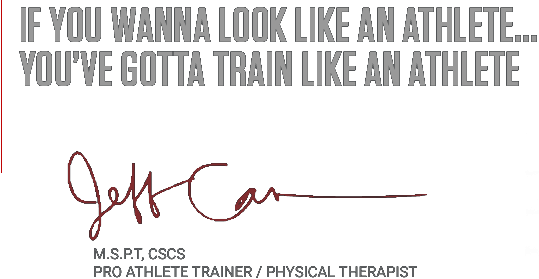PUTTING THE SCIENCE BACK IN STRENGTH
each program is designed to get you looking, moving and feeling like an athlete...whether you train at home or at the gym!

COMPLETE ATHLETIC TRAINING
If you want to look like an athlete, you have to train like an athlete. This step by step 90 day training and nutrition plan, combines strength and conditioning to help you build a ripped, lean athletic body.
LEARN MORE
DUMBBELL TRAINING PROGRAM
JACKED dumbbell training program takes advantage of the latest in science based muscle building to place you in hypertrophy range whether you have a full rack of dumbbells or a single pair of dumbbells.
LEARN MORE
TOTAL BODY MUSCLE BUILDING
If you want to unleash all new muscle and strength gains without unnecessary bulking and cutting, this 90 day training and nutrition plan delivers “beastly” results with its proven size building science.
LEARN MORELet me help you find the right plan
LEARN MOREPUTTING THE SCIENCE BACK IN SUPPLEMENTATION
STOP PUTTING YOUR FAITH IN PROPRIETARY BLENDS AND INFLATED LABEL CLAIMS. OUR CLINICALLY DOSED FORMULAS ARE TRUSTED BY THE PROS.
RESULTS THAT SPEAK FOR THEMSELVES
It is said that a picture is worth a thousand words. Here at ATHLEAN-X™, our thousand plus before and after pictures speak loud and clear as to the power of the programs and supplements we provide. Real men and women from all walks of life, fitness levels, body types, and ages have changed their bodies and lives with the exact programs you’ll have access to when you join TEAM ATHLEAN!
VIEW STORIES OF SUCCESS

Training Equipment & Apparel
Shop our ultra comfortable athletic fit tees and official branded A-X hats to show off your gains and make a statement about how serious you take your training without having to say a word. Want to create the ultimate home gym? Our versatile, resistance training bands and space saving dumbbells will help you create your very own ATHLEAN X-BOX without breaking the bank!
VIEW APPAREL ELAST-X BANDSJeff Cavaliere MSPT, CSCS served as both the Head Physical Therapist and Assistant Strength Coach for the New York Mets and is now one of the world’s most trusted authorities on science based training and performance. The most accomplished musicians, actors, athletes, teams and well over 11 million followers rely on his hands-on experience and expertise to get them looking, feeling and moving like athletes via his ATHLEAN-X™ brand training and supplements.
LEARN MORE










